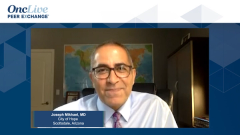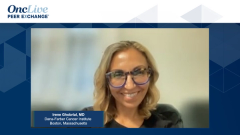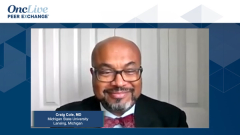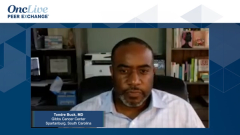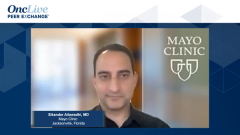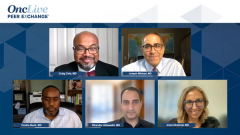
Multiple Myeloma: Disparities in Access to Specialized Care
Comprehensive discussion on access to specialized care and how racial and ethnic minority groups encounter barriers in this setting.
Episodes in this series

Transcript:
Joseph Mikhael, MD: Tondre, I'm going to turn to you for a moment to think about another area. We have data clearly showing that its diagnosis is delayed. Let's assume now that the diagnosis is made. That part of the journey of many patients is going to involve access to a specialized center. Be it for transplant, or trial, or whatever else. I know that you've done some interesting work in your region and throughout much of the southeast in this area. Maybe you can help us understand. Is access to specialized care part of the problem? I know the answer is yes, but I know you can tell us in a much more sophisticated manner.
Tondre Buck, MD: Absolutely. Once again, thank you guys for having me. From my perspective, I trained in Mississippi, and I stayed on staff there and what I found out, just a little personal background out there, we were the only transplant center in Mississippi. When I first got on staff there I started going way out into the rural communities and out in the areas and like hey why don't you all send us patients for transplant? You'd be amazed at the different things that we heard. I didn't know you all do transplants. I thought everybody that got transplants died. You get these sorts of barriers where community physician is way out don't realize what's going on in a particular disease type and state. Just for example a high African American population and they do general oncology and they're not able to keep up with specialization of something like multiple myeloma. There are several different barriers, but like you stated earlier we all know access to transplant, access to a specialized center that has improved survival and I love your statement from earlier. I'm going to steal that and use that from here on out but it's a complicated process. As we move along patients are getting more information. The other part about this what I found to be effective, and I know we haven't got into solutions yet is word of mouth, on the ground, letting local oncologist know that for this particular disease that it is absolutely mandatory, necessary that you get a transplant specialized center involved. Once again, it's a complicated question that's going to involve some groundwork and on the ground boots on the groundwork to get this thing turned around.
Joseph Mikhael, MD: We'll talk more in our third module about how we might be able to fix it. What I'm hearing you say, Tondre is that it's not just geography. The geography may make it worse, but there is a perception, a misunderstanding of the benefits of going into that specialized center.
Tondre Buck, MD: It is way more than geography. It is socioeconomic. It is physician. It is patients. Geography to me only plays a part in it. Probably more important factor once again is misinformation, miseducation from a physician standpoint. And from a patient standpoint once again socioeconomic status. Let me give you an example. We all can agree to this you take an inner city poor socioeconomic area compared to a rural poor socioeconomic area, we know that those 2 factors based off the clinical data that we have now, patients do worse, based off those clinical factors also.
Joseph Mikhael, MD: No, that's really very important. Thank you. Sikander, I know you wanted to chime in for a moment here.
Sikander Ailawadhi, MD: Yes, Joe one very quick thought is also as Tondre was mentioning that talking about rural, talking about poor socioeconomic inner-city areas. Another factor to think about is while we talk about access to large centers, access to transplant centers, academic centers, trials, another important piece which is so important for every single patient is need for that caregiver support, need for that situation where they need to get time off from work to catch that bus and the taxi and the train that the patient needed to take to go to Craig and see them in the clinic. But again, it's that vicious web that our patients are stuck in where they have to literally take those decisions on a day-in-day-out basis. What should I use my limited resources towards? To going to a faraway doctor? Towards taking time off from work and sitting in a transplant center? Towards paying for my expensive co-payment options, etc., etc. It's important to know we can help. There are options but this is a vicious kind of quicksand that patients sometimes feel themselves stuck in.
Joseph Mikhael, MD: No, that's beautifully said, and I think you know as I said when we come to our third module, and we think about solutions I want to come back to you on that because I do think that's something we have done so poorly. We've not even recognized the problem let alone recognize the potential solution that sometimes, as you said, it's transportation for the patient but it's also the fact that they're caring for others at home. Who's going to care for those children or for those seniors in that home that that person is the primary caregiver, care partner for? It's more than just trying to find a taxi service, right? It's many of those things. It's giving respite for the family, childcare, you know all those kinds of things. Especially in the context of the specialized center or clinical trial.
Transcript edited for clarity.


